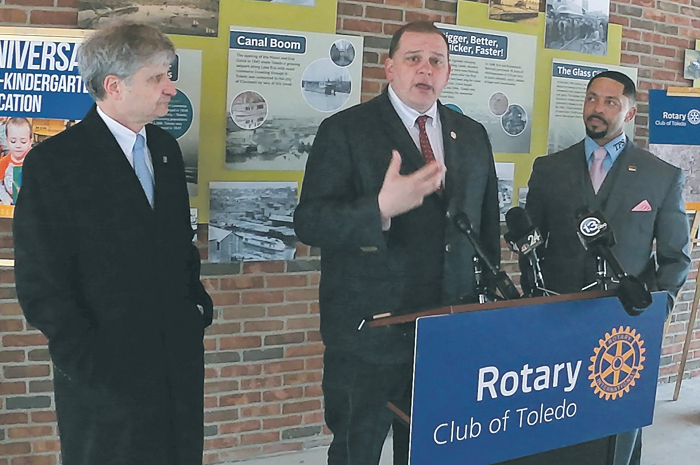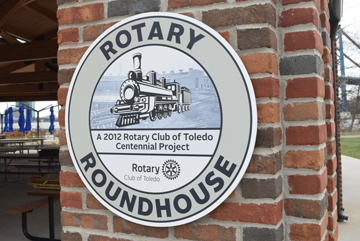
As published in Toledo Business Journal - May 1, 2019

(Left to right) Dick Wolff, Rotary Club of Toledo president;
Toledo Mayor Wade Kapszukiewicz;
and Romules Durant, Toledo Public
Schools superintendent
In mid-April, members of the Rotary Club of Toledo and community leaders announced three transformational initiatives that the organization will be launching.
Some information on the Rotary organization’s long history of undertaking transformational projects provides insight into the capabilities and bold approach this organization brings to programs that it undertakes.
In 1916, a major polio outbreak in New York City killed more than 2,000 people. Across the United States in that year, polio took the lives of about 6,000 people. In the years that followed, polio killed and paralyzed many thousands more around the world.
In 1979, an initiative was launched that would lead to the implementation of a transformational project aimed at the complete eradication of polio. A multi-year project to immunize six million children in the Philippines was begun by Rotary International in 1979. In 1985, the organization launched PolioPlus, a program that provided private-sector support of an internationally coordinated public health initiative, with an initial fundraising target of $120 million.
According to the organization that launched this transformational project, “Rotary is an international community that brings together leaders who step up to take on the world’s toughest challenges, locally and globally. The eradication of polio is one of our longest standing and most significant efforts. Along with our partners, we have helped immunize more than 2.5 billion children against polio in 122 countries. We have reduced polio cases by 99.9% worldwide and we won’t stop until we end the disease for good.”
40 years after the launch of Rotary International’s first polio initiative, the Rotary Club of Toledo has recently launched three transformational projects with each aimed at impacting the region. The local club identified four potential initiatives and members were given the opportunity to select one project for the organization to focus its efforts. Instead of selecting a project, members determined that efforts and resources would be organized to launch three of the initiatives.

Significant efforts have been underway in the Toledo area to find a way to impact and improve the education of young children. Studies have made it clear that high quality early childhood education programs have been shown to impact kindergarten readiness, elementary school reading levels, and overall life outcomes.
There are 8,884 children ages 0-5 under the federal poverty line in the City of Toledo and 13,992 in Lucas County, and only a small percentage are able to access quality early childhood education. 65% of kindergarteners enter Toledo Public Schools testing developmentally behind on the Ohio Kindergarten Readiness Assessment.
The Rotary Club of Toledo is planning to invest $10,000 in initial research to evaluate the implementation of a universal pre-kindergarten initiative. Then $90,000 will be expended based on the findings of the initial research in order to implement a universal pre-kindergarten program.
Toledo Rotary will also work with local government, business, and other organizations to advocate for universal pre-kindergarten education in the community. The service organization will find additional partners to fund and participate in the exploration of the most effective ways to implement and expand this program.
Lead poisoning, recognized as one of the greatest environmental health risks facing children around the country, is a significant issue in the Toledo area. Those under the age of four are most at risk
In urban areas as many as 50% of the child population has excessive levels of lead in their bodies. Children absorb 50% of lead taken into the body as opposed to adults at 10%. Further, pregnant women are at risk of passing on effects of lead consumption to their unborn child.
A second Rotary initiative will focus on lead abatement in the area. The Rotary Club of Toledo’s efforts involve collaboration with health, government, and educational institutions to promote cost effective ways of reducing lead poisoning in children. The initiative will require partnering with other area service organizations on the Lead Free by 2023 agenda.
The program will work to identify homes with lead paint and water pipes that were built before 1978, focusing on 20% of the homes that are likely contributing to 80% of lead exposure. It will also involve educating the community about lead poisoning prevention.
In 2014, a toxic algae bloom left 500,000 people in the Toledo area without drinking water. In the last four years, the issue has been controlled, but the prominence of algae blooms has increased. Toledo Rotary’s involvement with the northwest Ohio regional harmful algal bloom (HAB) water issue has moved through the initial steps of education through two regional water conferences.
Toledo Rotary has participated in tours to the Blanchard River Watershed Demonstrations Farms and the Ohio State Stone Lab on Gibraltar Island. Members have also participated in wetlands reconstruction with the Black Swamp Conservancy.
Toledo Rotary’s next step in water advocacy is to participate in advocacy with State of Ohio legislators and executive branch members who develop and implement programs governing the health of State waters.
With anticipated support from area State representatives, Toledo Rotary members will make at least two trips annually to Columbus to campaign for water advocacy. The chapter will sustain this routine campaigning over several years until legislation is completed which ensures the reduction in nutrient loading committed to under Ohio’s agreement with Michigan and Ontario. That agreement commits to 20% nutrient reductions by 2020 and 40% by 2025.